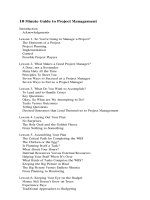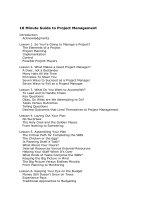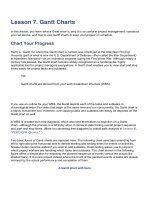10 Minute Guide to Investing in Stocks Appendix pptx
Bạn đang xem bản rút gọn của tài liệu. Xem và tải ngay bản đầy đủ của tài liệu tại đây (675.26 KB, 50 trang )
I l@ve RuBoard
Appendix A. Glossary
Glossary
I l@ve RuBoard
I l@ve RuBoard
Glossary
52-week high-low
Entries in the daily stock tables of the highest and lowest point at which the
stock has traded during the past year.
aggressive growth stocks
Stocks that focus on their potential for capital gains and accept higher
principal risk to achieve this growth.
American Stock Exchange
Originally founded as the New York Curb Exchange in 1842, the American
Stock Exchange is rivaled in prestige only by the New York Stock Exchange.
AMEX Market Value Index
An index composed of 800 stocks that trade on the American Stock
Exchange. This type of index is based on the belief that the health of the
American economy is best represented by the performance of the
proprietary market.
asset
Anything owned that has value such as cash, real estate, intellectual
property, or name recognition.
bankruptcy
A court declaration of the financial insolvency of a person or company.
blue chip stock
A designation for share of a company that is extremely well established and
financially secure.
book value
A measurement of the total value of a company determined by adding up
the values of all tangible assets. Or, the value of each share of common
stock should the company declare bankruptcy, determined by dividing the
value of the assets of a company by the number of its outstanding shares.
broker
Anyone who has received qualification to trade stock for clients by passing
the Securities Exchange Commission's Series 7 Exam.
brokerage accounts
Monetary deposits maintained with a broker to trade stock.
buy and hold
An investment strategy characterized by purchasing stock to retain for an
extended period of time. Additionally, buy and hold usually implies that
dividends will be reinvested in subsequent purchases of the stock.
call
A contract that grants the bearer the option of purchasing stock for a
predetermined price in the future regardless of the stock's actual market
value at that time.
capital appreciation
The growth in the value of any type of investment asset such as stock or real
estate.
capital gains
The total amount of profits from the sale of, or potential sale of, an
investment asset.
cash account
A brokerage account stipulating that the investor can make no stock
purchase larger than the amount of money within the account.
closing price
The amount at which the stock settled at the end of the trading day.
commodity futures
Contracts to buy or sell a specified amount of a product such as sugar,
cotton, or precious metals for a predetermined price and date in the future.
These contracts have value and are traded like stock.
common stock
A share of common stock is characterized by its owners receiving fluctuating
dividends and voting one proxy per share.
compound interest
Interest paid as a percentage of the initial amount loaned and previous gains
made with prior interest payments.
conservative growth stocks
Stocks that focus on their capital gains potential, but not at the expense of
excessive capital risk.
constant dollar plan
An investment strategy in which the investor adds or subtracts cash to keep
the number of original stock purchased constant.
corporate bond
An interest-paying certificate of indebtedness issued by a corporation to
investors for the purposes of raising capital or cash.
credit limit
A predetermined maximum amount a person or company is entitled to
borrow from a particular lender.
credit rating
A comprehensive data file of an individual's or a firm's past performance in
the repayment of loans, or the ranking bestowed on that individual or firm
by the credit rating company based on the same information. Also,
evaluations by disinterested parties and services regarding the financial
health of a company or individual.
current ratio
A projection of the company's ability to meet its financial obligations and
remain solvent.
current yield
A formula that depicts the dividend payment of a stock as a percentage of
the stock's market price.
custodial account
A brokerage account for a minor set up under the rules of the Uniform
(Gifts) Transfers to Minors Act whereby an adult oversees the account's
management on behalf of the minor until he or she becomes a legal adult.
daily high-low
Entries in the daily financial tables that list the highest and lowest point at
which the stock traded over the course of the day.
debt
Anything owed.
debt ratio
A formula that compares a company's total debt to its assets and cash flows.
derivative
An investment that is based on a stock's performance.
discount broker
A broker who provides financial services individually rather than full service.
dividends
The portion of profits a company pays to its stockholders, usually in
quarterly annual payments.
dividends per share
The amount of the last dividend paid.
dollar cost averaging
An investment strategy characterized by systematically investing a
predetermined amount on a regular basis.
Dow Jones
A series of four separate indices that currently trades on the New York Stock
Exchange and is considered by many to best represent the activity of the
market and the American economy.
e-broker
A broker who provides financial self-service options online.
earnings per share
A company's net earnings divided by the number of its outstanding common
shares.
evaluation
A projection of the future performance of the stock through the use of
statistics and formulas.
financial media
Various methods by which an investor can accumulate financial information
such as television, radio, newspapers, magazines, and the Internet.
full service broker
A broker who provides complete management over clients' accounts.
growth stock
Shares of a small company that is believed by its shareholders to have
excellent potential to become larger.
income stocks
Shares of a company that focus on providing higher and more regular
dividend payments over capital gains.
indices
A number of stocks whose prices are combined and averaged to
demonstrate value changes in a particular market.
inflation
An economic condition in which prices rise resulting in a decrease in
purchasing power.
inflation risk
The danger that your investment will not maintain its initial purchasing
power because it is not growing as fast as the national inflation rate.
interest
An attached charge for the loan of money. The borrower pays, and the
loaner receives, an amount above and beyond the initial amount loaned.
international markets
Stock exchanges in other countries.
liability
Anything owed, including bills, taxes, loans, or other financial obligations.
limit orders
Instructions to a broker to purchase stock at a price lower than the current
market price or sell it at a price higher.
long-term capital gains
The total amount of profits from the sale of, or potential sale of, an
investment asset that has been held more than one year.
margin account
A brokerage account that permits the purchase of stock with credit.
market order
Instructions to trade stock immediately at the best possible price. A market
order is also known as an open order.
market price
The amount that can be received upon the sale of property.
market risk
The danger that a stock's performance will be influenced by conditions within
the markets in which they trade.
miscellaneous information
Data in the daily stock tables such as currency exchange rates, IPO
offerings, and analyst predictions.
money market
A mutual fund that invests in bank certificates of deposit, treasury bills, and
loans to corporations that are considered particularly secure.
mutual fund
A variety of securities that are purchased with money pooled by a group of
investors.
NASDAQ (National Association of Securities Dealers Automated
Quotations system)
A computerized network over which brokers trade over-the-counter
securities.
NASDAQ National Market System Composite Index
An index composed of over-the-counter stock traded on the NASDAQ
system.
net change
The difference between a stock's current and previous day's closing price.
net worth
The total value of a company or an individual calculated by subtracting all
liabilities from all assets.
New York Stock Exchange
Established in 1817, the NYSE is the largest and most prestigious stock
exchange in the world.
New York Stock Exchange Index
An index composed of all 1,600 stocks trading at the New York Stock
Exchange.
odd lots
Shares of stock that are purchased outside of a predetermined standard.
orders
Instructions to a broker on how stock should be traded.
options
A contract between two parties to trade stock at a predetermined price.
over-the-counter
Stocks that are traded over the largest stock trading network in this country,
a computerized network known as NMS.
P/E ratio
A comparison of the current market value of the stock to its dividend
payments.
penny stock
Highly speculative shares in a company with little or no real value other than
uncertain growth potential.
political/governmental risk
The danger that domestic and international governmental actions will have
ramifications affecting a stock's performance.
portfolio reevaluation
Periodic investment recalculations using newer and increased information to
ensure the original decision is still correct or applicable.
preferred stock
A share of stock that is issued after common stock and whose dividends are
a predetermined amount and paid prior to common stock's dividends.
puts
A contract that grants the option of selling stock at a predetermined price in
the future regardless of the stock's actual market value at that time.
principal
The initial amount of money used to purchase an investment.
qualifiers
Symbols and initials on the stock tables that denote circumstances
associated with the corresponding stock information.
recommendation
A request for, or the receipt of, information or insight from a person who
may have a better insight into the stock's future performance.
regional exchange
One of 14 exchanges around the United States that offer the larger stocks of
the NYSE or AMEX and proprietary-listed stock for trade.
research
Checking sources for information on a stock and/or its performance.
round lots
A predetermined number of shares of stock that is considered standard for
trade.
Russell Indices
Three indices that rate the activities of stocks, based on their market
capitalization. The smallest, the Russell 1000, measures the activities of the
1,000 largest capitalized companies, while the Russell 2000 measures those
of the less capitalized companies.
secondary stock
Shares of a company with substantial backing that is not considered blue
chip.
short-term capital gains
The total amount of profits from the sale of, or potential sale of, an
investment asset that has been held for one year or less.
speculate
To take greater risks when investing in order to make larger gains.
speculative stocks
Stocks that have little or no real value other than unsupported potential (for
example, long shots).
Standard and Poor's 500
An index composed of the 500 largest stocks trading on the NYSE and the
NASDAQ.
stock
A representation of partial ownership of a company. A stock can be either a
physical document or a computerized account.
stock market
Centralized physical locations or computer networks over which stock is
traded.
stock name
An entry in the daily stock table, usually in the form of abbreviations and
acronyms.
stock symbol
An entry in the daily stock tables of the symbols used to identify a stock,
composed of one- to four-letter combinations.
stop orders
Instructions to a broker to sell stock at a price lower than the current market
value or buy it at a price higher than the current market value.
subscription right
An option granted to current shareholders to buy future-issued stock at a
discount price.
tax-free bond
A bond issued by state or local government to investors for raising capital or
cash of which interest is exempt from municipal, state, and/or federal taxes.
ticker tape
Originally an actual machine; the term is currently used to describe an
electronic ribbon which carries information on currently occurring stock
trades.
time notations
Instructions to a broker regarding how long an order should remain in effect.
GTW
Good Through the Week.
GTM
Good Through the Month.
GTC
Good unTil Canceled.
Treasury securities
U.S. government obligations that are available for purchase to the public
through Federal Reserve banks. Investments of this type include Treasury
bills (T-bills), bonds, certificates, and notes.
utility stock
Shares in a company that provides public service such as gas or electricity.
Vol 100s
An entry in the daily stock tables of the number of total shares traded that
day. The figure in this column must be multiplied by 100 when under 10,000
for the correct number of traded shares.
warrant
A contract issued by a company to purchase its stock at a predetermined
price regardless of the market value of the stock at that time.
Wilshire 5000 Index
An index composed of all quoted stocks on the NYSE, AMEX, and NASDAQ
markets, over 5,000 in all. It is designed to measure activity in all markets
to best represent the overall health of the American economy and is the
largest of all popular indices.
Yield Percent
The ratio of dividends paid by a stock to its closing price which is used to
depict the amount of income generated by the stock relevant to its initial
investment requirement.
I l@ve RuBoard
I l@ve RuBoard
Appendix B. Resources
Credit Reporting Agencies
Financial Media
Brokers
Online Research
I l@ve RuBoard
I l@ve RuBoard
Credit Reporting Agencies
While other credit reporting agencies do exist, the following two are the most commonly
utilized by everyone. A personal copy of your credit file is made available upon request.
Experion
P.O. Box 949
Allen, TX 75013-0949
1-888-397-3742
Trans Union
P.O. Box 403
Springfield, PA 19064-0403
1-800-916-8800
I l@ve RuBoard
I l@ve RuBoard
Financial Media
Almost all local newspapers of any reasonable size run stock tables daily. In addition, several
general newspapers such as The New York Times and financial newspapers such as The
Wall Street Journal run national editions available through subscription virtually anywhere. A
quick trip to your local bookstore or library will provide discovery of so many magazines that
focus exclusively on various aspects of finance that a comprehensive list would be
impossible. Several of the more popular financial magazines are listed here with contact
information, should you find them unavailable on your local newsstand.
Also, please be aware that all daily television news programs run a section on the day's
trading. More comprehensive pictures of stock market activity are available through television
shows such as Moneyline as well as dedicated financial networks such as CFNN.
The New York Times
229 W. 43rd Street
New York, NY 10036
1-800-639-8463
The Financial Times
1330 Avenue of the Americas
New York, NY 10019
1-800-628-8088;
The Wall Street Journal
200 Liberty Street
New York, NY 10281
1-800-568-7625;
Investment News
220 E. 42nd Street
New York, NY 10017-5846
212-210-0114;
Forbes Magazine
60 5th Avenue
New York, NY 10011
1-800-888-9896;
Fortune
P.O. Box 60001 Tampa,
FL 33660
1-800-621-8000;
Salomon Smith Barney
1-888-SERIOUS;
Prudential Investment Management
751 Broad Street
Newark, NJ 07102-3777
1-800-THE ROCK;
I l@ve RuBoard
I l@ve RuBoard
Brokers
The following list is neither comprehensive nor should be considered a recommendation for
any of the listed brokers. It is supplied only to give you a starting point from which to search
for your own broker or brokerage account. Almost all these brokers offer services ranging
from full service to online trading. You will need to determine the services that are most
applicable to your own needs. In addition to this national contact information, you should
check your local Yellow Pages under Investment Management.
Goldman Sachs
1-877-813-2445;
Donaldson, Lufkin & Jenrette (DLJ Direct)
1-800-355 -8888;
National Discount Brokers
1-800-417-7423;
TD Waterhouse
Barclays Global Investors
415-597-2000;
Ameritrade
1-800-454-9272;
J.P. Morgan
212-648-9607;
Salomon Smith Barney
212-816-6000;
Morgan Stanley Dean Witter
1-800-240-3932;
Wall Street Access
1-800-925-5782;
Fidelity Investments
1-800-343-3548;
I l@ve RuBoard
I l@ve RuBoard
Online Research
Nothing since the introduction of money has affected finance as significantly as the Internet.
In addition to the Web sites listed with each broker, the following listed browsers and home
pages have extensive finance areas ranging from topics as basic as budgeting to extensive
topics such as macroeconomics. They also offer chat rooms, where you can speak to other
investors, and portfolio management, where you can list and track your investments. In
addition, these pages, as well as the independent research sites listed, all provide daily news
that may affect your investments and offer free e-newsletter subscriptions. Again, this list is
neither comprehensive nor a recommendation, but simply a push in the right direction.
I l@ve RuBoard
I l@ve RuBoard
10 Minute Guide to Investing in Stocks
[A][B][C][D][E][F][G][H][I][L][M][N][O][P][Q][R][S][T][U][V][W][Y]
A
accounts
brokerage
opening , 2nd , 3rd , 4th
ADRs
(American Depository Receipts)
agencies
credit reporting
aggressive growth stocks
amassing emergency funds , 2nd
See : ADRs American Depository Receipts
See : AMEX American Stock Exchange
AMEX , 2nd
(American Stock Exchange)
Market Value (index)
appreciation
assets , 2nd
away from the market (limit orders)
I l@ve RuBoard
I l@ve RuBoard
10 Minute Guide to Investing in Stocks
[A][B][C][D][E][F][G][H][I][L][M][N][O][P][Q][R][S][T][U][V][W][Y]
A
accounts
brokerage
opening , 2nd , 3rd , 4th
ADRs
(American Depository Receipts)
agencies
credit reporting
aggressive growth stocks
amassing emergency funds , 2nd
See : ADRs American Depository Receipts
See : AMEX American Stock Exchange
AMEX , 2nd
(American Stock Exchange)
Market Value (index)
appreciation
assets , 2nd
away from the market (limit orders)
I l@ve RuBoard









